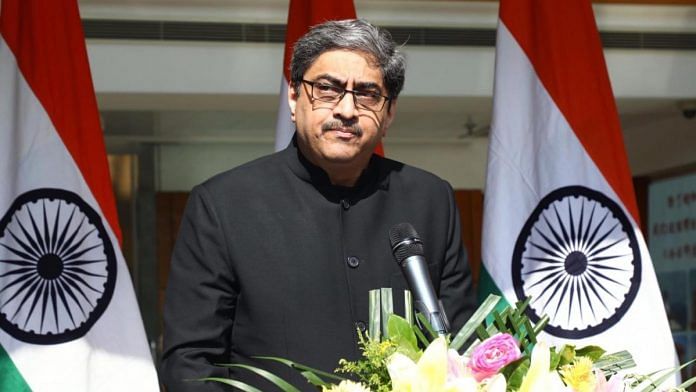New Delhi: The Ladakh stand-off is not merely a military affair, but also something that impinges on India’s interests when it comes to economy, science, technology and innovation, former ambassador to China Gautam Bambawale said in a virtual press conference hosted by the Pune International Centre Tuesday.
Last week, India held diplomatic talks with China to negotiate a “mutually acceptable” way to complete the withdrawal of troops from the remaining face-off points along the Line of Actual Control. The two countries have been engaged in a military confrontation since May 2020, over the harsh winter in Ladakh.
“It’s not merely a short game of moving around our military resources,” Bambawale said. “You cannot decouple trade and investment and other economic exchanges from the kind of political and military exchanges we have with China.”
Bambawale was speaking on a policy paper that he co-authored, titled ‘Strategic Patience and Flexible Policies: How India Can Rise to the China Challenge’, which has been submitted to the Indian government. The other authors, who were also present in the conference, include former director general of the Council of Scientific and Industrial Research, Raghunath Mashelkar; IT industry veteran Ganesh Natarajan; independent scholar Ajay Shah; and economists Ajit Ranade and Vijay Kelkar.
The 22-page paper proposes that India develop “a short-term strategy of sophisticated and nimble foreign policy with a long-term strategy of strategic patience with domestic reform which generates high economic growth”.
Also read: ‘New Delhi key to Indo-Pacific’ — Eye on China, India & US call for deepening of defence ties
Industry-specific strategies to overcome ‘asymmetry’ with China
The paper observes major gaps between India and China. In 1980, the size of China’s economy was US$ 305 billion, but by 2019, it was US$ 14 trillion. In the same period, India’s GDP rose from US$ 189 billion to US$ 2.9 trillion.
“In the short run, the hand of cards which India has been dealt is not favourable,” it states.
The experts put forth three industry-specific strategies by which India can overcome “asymmetry” with China in terms of economy, science, technology and innovation.
First, India should work towards making mining and production of rare earth elements more attractive for the private sector, and join some global supply chains in this area.
Second, India should focus on opportunities that are not just “atmanirbhar” (self-reliant) but also foster “atmavishwas” (self-confidence). The paper credits the Indian government’s Production-Linked Incentive or PLI scheme, which aims to incentivise companies to manufacture products domestically, calling it an “encouraging step”.
Giving the telecom sector as an example, the authors suggest the Indian government should allocate 1 per cent of annual GDP towards publicly funded fiber infrastructure, reduce dependency on the private sector and block the entry of Chinese players.
“There is an imperative to stem the influx of imports of optical preform, optical fiber, and optical fiber cable products through safeguard and/ or higher basic custom duty, to encourage local capacity development,” they state.
Third, the paper suggests India improve its participation and integration in global industries like consumer electronics, automobiles, chemicals, pharmaceuticals and agriculture, stressing the need to develop India’s IT industry further and enable sectors like financial services, agriculture, healthcare and e-commerce through digital platforms.
“We recognise that India is outmatched in the short-term,” Ajay Shah said. But he added that “rough parity” with China will take 20 years and restoring high GDP growth will be key.
Also read: Buy weapons from us, India says as it pushes exports to compete with China in neighbourhood
New way of diplomatic thinking
Bambawale said that Indian diplomacy will need to adopt a “new way of thinking” too.
Referring to the paper, he said India must build “balancing coalitions” with other countries, mainly 1) major democracies of the world, 2) countries which border China like Taiwan, and 3) India’s neighbours.
The former ambassador identified some of these countries, like the US, Japan, France and Sri Lanka, but stressed on the need to build a “people-oriented” partnership with Russia.
Bambawale also said that China prefers a “conflictual kind of relationship” with India. “Our goal is not to have a China-less economy, but to have less of China,” he said.
He added that India must limit companies controlled by the Chinese state from taking a controlling stake in assets, steer clear of Chinese-controlled technology standards, and block surveillance of Indian persons by Chinese entities.
Ranade, responding to a question on whether India can renegotiate its relationship with China, said: “We have to be careful about economic partnership with China… Now, everything has to be taken into account holistically and that includes India’s national interests.”
Shah concurred: “India should cautiously walk in terms of engagement with China… This is not a call for reckless protectionism… but (for) sophisticated thinking.”
(Edited by Shreyas Sharma)
Also read: India, China must resolve identity perceptions that lead to mistrust — ex-foreign secy Gokhale




With the passage of time more and more bureaucrats will retire and sermonise on many aspects of running the country which they did not do while in service.
At least before leaving the should try to introduce some of their thoughts so that the system benefits.